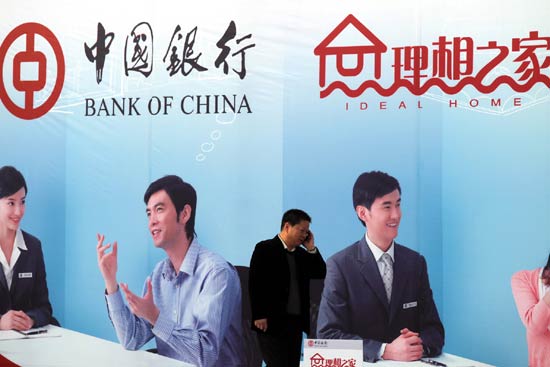Money
BOC loses out in yuan bonds sales
By Kaerina Nicholas (China Daily)
Updated: 2011-05-11 10:10
 |
Large Medium Small |
|
 Data from a Bloomberg survey shows Bank of China Ltd, which managed the most dim sum bond sales last year, slumped to 15th place, while Industrial and Commercial Bank of China Ltd slid to 20th from fourth. [Photo / China Daily] |
Bond sales may rise to 150 billion yuan this year as currency advances
SINGAPORE - Chinese underwriters are losing out to international banks in a record year for issuance of yuan-denominated bonds in Hong Kong. That's as companies seek arrangers that are able to attract the most global investors.
Bank of China Ltd, which managed the most dim sum bond sales last year, slumped to 15th place, while Industrial and Commercial Bank of China Ltd slid to 20th from fourth, data compiled by Bloomberg show. HSBC Holdings PLC, Royal Bank of Scotland Group PLC and JPMorgan Chase & Co are the top three arrangers.
"I have a standing instruction for my team that anyone who speaks Mandarin has to come to Hong Kong," said Augusto King, co-head of debt capital markets for Asia at RBS, the No 2 arranger of sales this year after not being ranked in 2010. "We're expecting a lot more Chinese corporates to tap this market."
The debt pays an average yield of 2.352 percent compared with 4.642 percent for one- to three-year corporate bonds in Shanghai, HSBC and Bank of America Merrill Lynch indexes show. Similar maturity US corporate bonds yield on average 1.6 percent, according to Bank of America indexes.
Of the 46 dim sum sales this year, non-bank companies accounted for 21, compared with 10 of 28 sales in 2010, according to data compiled by Bloomberg. The top three arrangers accounted for 31 issues, the data show.
"We've helped to broaden both the issuer and investor base and brought many debut issues to the market," said Gina Tang, HSBC's head of debt capital markets for Hong Kong and the Chinese mainland. HSBC had a 31 percent market share, helping 18 deals valued at about 12.7 billion yuan.
Beijing Capital Land Ltd, one of the city's biggest landowners, sold 1.15 billion yuan of 4.75 percent notes due on Feb 15, 2014 in the first sale of dim sum bonds in Hong Kong by a Chinese property company, data compiled by Bloomberg show. Unilever NV, based in Rotterdam, Netherlands, sold 300 million yuan of bonds in Hong Kong at 1.15 percent, becoming the first European consumer company to sell such bonds, according to a person familiar with the transaction.
China is promoting the use of its currency for offshore trade and investment as it seeks to curb reliance on the dollar. Yuan deposits in Hong Kong rose to a record 451.4 billion yuan in March and may climb to 870 billion yuan by the end of the year, said Zhang Guangping, deputy director general of the China Banking Regulatory Commission's Shanghai branch, last month.
China's currency was the best performer among the BRIC group of emerging economies from the end of 2000, rising 27 percent against the dollar compared with a 21 percent advance for the Brazilian real, a 4 percent gain for the Indian rupee, and a 1 percent advance for the Russian rouble, according to data compiled by Bloomberg.
Chinese companies can borrow at lower rates in Hong Kong, as the People's Bank of China raises interest rates to curb inflation that reached an annual rate of 5.4 percent in March. Policymakers have raised interest rates four times since September. On April 21, major lenders' reserve-requirement ratios were raised by half a percentage point to 20.5 percent.
"This was a market we didn't have as a capability until January of this year," Murlidhar Maiya, JPMorgan's head of debt capital markets for Asia ex-Japan, said in Hong Kong. "We put a massive task force on it, started marketing to clients" and achieved a top three position within four months.
RBS of London forecasts yuan debt sales in Hong Kong may triple this year. The increase in yuan-denominated securities will likely "only account for around 24 percent of offshore yuan deposits by the end of 2011", according to Kristine Li, RBS' Singapore-based chief financial credit strategist for Asia, excluding Australia.
While money that's raised in international capital markets faces restrictions when brought back into China, Hopewell Highway Infrastructure Ltd, controlled by Hong Kong billionaire Gordon Wu, is selling dim sum bonds for the second time in less than a year.
The company plans to sell 600 million yuan of notes that will mature in 2014 and use the money to develop Phase III of its Western Delta route and for new projects, according to a company media statement on Monday.
Companies raising money for projects important to China will find it easier to get approvals, said Walter Wu, chief investment officer at ICBC Asia Investment Management, the fund management unit whose Global RMB Fixed Income Fund oversees 279.1 million yuan of assets.
"China is very concerned about inflationary pressures but funding that's to be used for projects like alternative energy or infrastructure will more likely receive approval," Wu said from Hong Kong. "For issuers, it's very much a case-by-case basis."
Bloomberg News
| 分享按鈕 |



